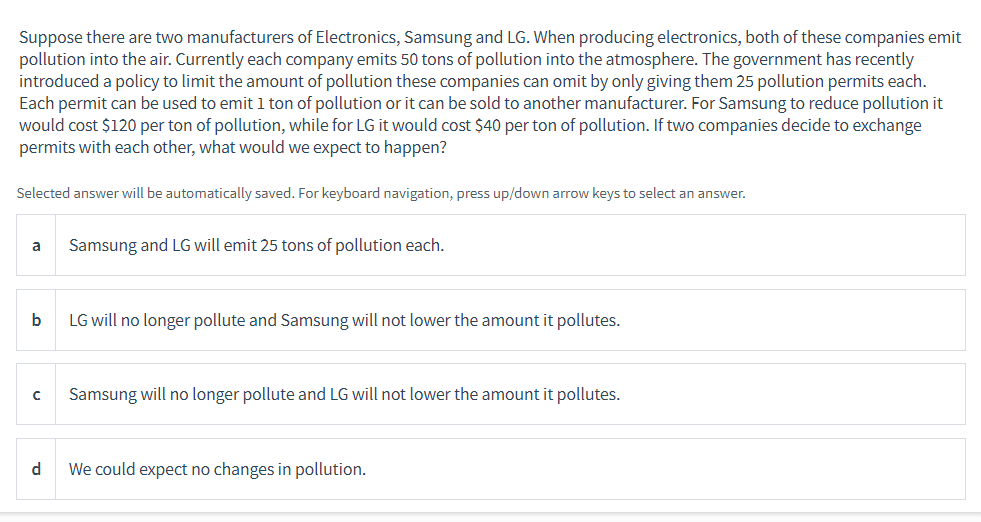Suppose there are two manufacturers of Electronics, Samsung and LG. When producing electronics, both of these companies emit pollution into the air. Currently each company emits 50 tons of pollution into the atmosphere. The government has recently introduced a policy to limit the amount of pollution these companies can omit by only giving them 25 pollution permits each. Each permit can be used to emit 1 ton of pollution or it can be sold to another manufacturer. For Samsung to reduce pollution it would cost $120 per ton of pollution, while for LG it would cost $40 per ton of pollution. If two companies decide to exchange permits with each other, what would we expect to happen? Selected answer will be automatically saved. For keyboard navigation, press up/down arrow keys to select an answer. a b с d Samsung and LG will emit 25 tons of pollution each. LG will no longer pollute and Samsung will not lower the amount it pollutes. Samsung will no longer pollute and LG will not lower the amount it pollutes. We could expect no changes in pollution.
Suppose there are two manufacturers of Electronics, Samsung and LG. When producing electronics, both of these companies emit pollution into the air. Currently each company emits 50 tons of pollution into the atmosphere. The government has recently introduced a policy to limit the amount of pollution these companies can omit by only giving them 25 pollution permits each. Each permit can be used to emit 1 ton of pollution or it can be sold to another manufacturer. For Samsung to reduce pollution it would cost $120 per ton of pollution, while for LG it would cost $40 per ton of pollution. If two companies decide to exchange permits with each other, what would we expect to happen? Selected answer will be automatically saved. For keyboard navigation, press up/down arrow keys to select an answer. a b с d Samsung and LG will emit 25 tons of pollution each. LG will no longer pollute and Samsung will not lower the amount it pollutes. Samsung will no longer pollute and LG will not lower the amount it pollutes. We could expect no changes in pollution.
Chapter8: Game Theory
Section: Chapter Questions
Problem 8.7P
Related questions
Question

Transcribed Image Text:Suppose there are two manufacturers of Electronics, Samsung and LG. When producing electronics, both of these companies emit
pollution into the air. Currently each company emits 50 tons of pollution into the atmosphere. The government has recently
introduced a policy to limit the amount of pollution these companies can omit by only giving them 25 pollution permits each.
Each permit can be used to emit 1 ton of pollution or it can be sold to another manufacturer. For Samsung to reduce pollution it
would cost $120 per ton of pollution, while for LG it would cost $40 per ton of pollution. If two companies decide to exchange
permits with each other, what would we expect to happen?
Selected answer will be automatically saved. For keyboard navigation, press up/down arrow keys to select an answer.
a
b
с
d
Samsung and LG will emit 25 tons of pollution each.
LG will no longer pollute and Samsung will not lower the amount it pollutes.
Samsung will no longer pollute and LG will not lower the amount it pollutes.
We could expect no changes in pollution.
Expert Solution
This question has been solved!
Explore an expertly crafted, step-by-step solution for a thorough understanding of key concepts.
Step by step
Solved in 3 steps

Knowledge Booster
Learn more about
Need a deep-dive on the concept behind this application? Look no further. Learn more about this topic, economics and related others by exploring similar questions and additional content below.Recommended textbooks for you

